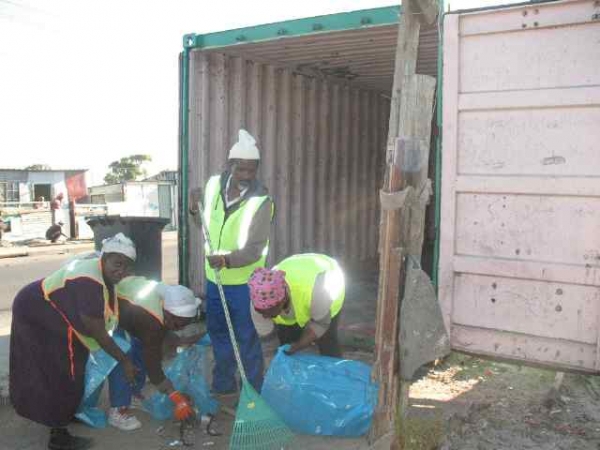

An archival photo of refuse collectors and cleaners clearing up the streets of Khayelitsha. Photo by Barbara Maregele.
15 September 2014
Every month since January, Khayelitsha’s refuse collectors and street cleaners in QA and PJS Section go in large groups to camp outside the supervisor’s office so they can get what is due to them.
Nosizwe (not her real name) said she started working in January as a street cleaner and has never received her payment on time, which should be the end of each month.
“When we started working we were told that we would get paid the day the month ends, the 30th or 31st, but we wait days, even a week till our money gets paid. Every month we go to the supervisor’s office and demand our money. We received our August salary on 4 September,” she said.
The workers get paid R100 a day.
Apart from late payments, they have not received overalls to work in. They clean up the rubbish with torn gloves and dressed in their own clothes.
The Social Justice Coalition (SJC) gets complaints of poor working conditions from street cleaners almost on a weekly basis. Ntuthuzelo Vika says the SJC had arranged a meeting with Fanyana Mfene, director for Green Guerrillas PTY Ltd, who was awarded the tender for the provision of community based refuse collection and area cleaning services in Khayelitsha, but the meeting was postponed.
“We were given another day for the meeting. When that day came, nothing happened. Since then, I have been calling non-stop. But because they now know my landline and cellphone numbers, my calls are not picked up,” said Vika.
Another cleaner, who identified herself as Noma, has been hired as a permanent worker, but says she still gets paid as a casual worker.
“We don’t know what to do anymore; when we have complaints we have to go all the way to the supervisor’s office, who then relays the message to Fanyana [Mfene]. After that no other information comes. I don’t understand why as a boss who receives all these complaints from your workers, you can’t take the time to address them and let them know what is being done about their grievances. At the end of the day, I was not employed by the supervisor; I was employed by him,” said Noma.
The SJC conducted a week long social audit last year September, on four cleaning and refuse collection tenders, after continuously getting complaints from workers about poor working conditions, late salaries and lack of uniforms, among other things. They found that no one in management took responsibility for the complaints. Instead the SJC was asked why the workers complained to SJC and not directly to management.
Mfene said the wage payments were delayed because of the banks that the workers used. Since the workers get paid at the end of each month, which is sometimes on a weekend, the processing takes longer because of their different banks.
“We are now meeting with all workers this coming Friday [19 September] and taking them to open bank accounts at Nedbank, the same bank that we are using. This will ensure that they get their money the same day. I am tired of explaining myself, but when I am quiet it comes across as if I don’t care.
“But we are getting this matter sorted out and we will liaise with the workers and let them know about the new plan to open new bank accounts. I have already spoken to Nedbank and they are expecting myself and the 46 workers,” said Fanyana.
GroundUp will follow up on the story on payday at the end of September.